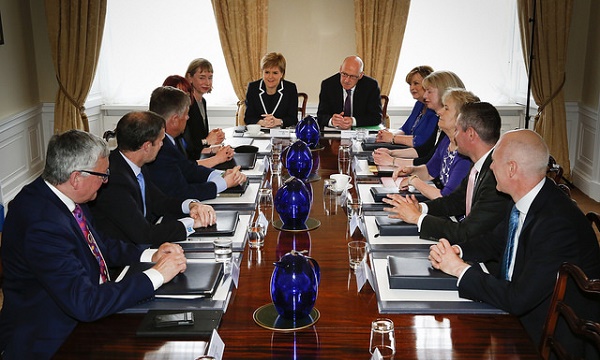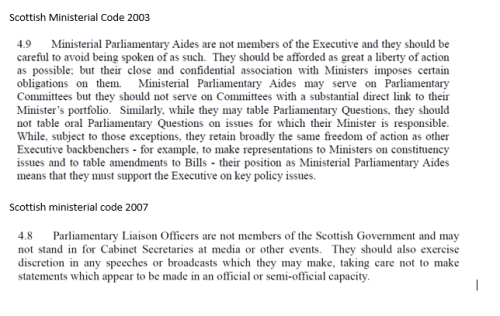The Scottish Parliament would be as powerless in an independent Scotland as it is now
In spite of the ‘power sharing’ idea inherent in Scotland’s devolution settlement, concerns have been repeatedly raised about how power is wielded in the Scottish Parliament. These deficiencies have so far not been addressed in a convincing manner. Paul Cairney examines the use of Parliamentary Liaison Officers (PLOs), pointing out that such practices undermine the existence of any meaningful dividing line between government and parliament. He argues that it is unlikely that anything would change if Scotland ended up achieving independence, as the political will to make meaningful improvements on this front seems to be absent.

The Scottish Cabinet holding a meeting at Bute House. Credits: First Minister of Scotland (CC BY-NC 2.0)
Here is a four-step plan to avoid having to talk about how powerless the Scottish Parliament tends to be, in comparison to the old idea of ‘power sharing’ with the Scottish Government:
- Find something the Scottish National Party (SNP) Government is doing and point out how wrong it is.
- Have the opposition parties pile in, taking their chance to bemoan the SNP’s power hoarding.
- Have the SNP point out that Labour used to do this sort of thing, so it’s hypocritical to complain now.
- Convince the public that it’s OK as long as all of the parties would have done it, or if they have been doing it for a long time.
This pretty much sums up the reaction to the SNP’s use of Parliamentary Liaison Officers (PLOs) on Scottish parliamentary committees: the Member of the Scottish Parliament (MSP) in question works closely with a minister and sits on the committee that is supposed to hold the minister to account. The practice ensures that there is no meaningful dividing line between government and parliament, and reinforces the sense that the parliament is not there to provide effective scrutiny and robust challenge to the government. Instead, plenary is there for the pantomime discussion and committees are there to have run-of-the-mill humdrum scrutiny with minimal effect on ministers.
The use of PLOs on parliamentary committees has become yet another example in which the political parties – or, at least, any party with a chance of being in government – put themselves first before the principles of the Scottish Parliament (set out in the run up to devolution). Since devolution, the party of government has gone further than you might expect to establish its influence on parliament: controlling who convenes (its share of) committees and which of its MSPs sit on committees, and moving them around if they get too good at holding ministers to account or asking too-difficult questions. An MSP on the side of government might get a name for themselves if they ask a follow-up question to a minister in a committee instead of nodding appreciatively – and you don’t want that sort of thing to develop. Better to keep it safe and ask your MSPs not to rock the boat, or move them on if they cause a ripple.
So, maybe the early founders of devolution wanted MSPs to sit on the same committees for long periods, to help them develop expertise, build up a good relationship with MSPs from other parties, and therefore work effectively to hold the government to account. Yet, no Scottish government has been willing to let go, to allow that independent role to develop. Instead, they make sure that they have at least one key MSP on each committee to help them agree the party line that all their MSPs are expected to follow. So, this development, of parliamentary aides to ministers corresponding almost exactly with committee membership, might look new, but it is really an extension of longstanding practices to curb the independent power of parliaments and their committees – and the party in government has generally resisted any reforms (including those proposed by the former Presiding Officer Tricia Marwick) to challenge its position.
Maybe the only surprise is that ‘new politics’ seems worse than old Westminster. In Westminster committees, some MPs can make a career as a chair, and their independence from government is far clearer – something that it is keen to reinforce with initiatives such as MPs electing chairs in secret ballots. In comparison, the Scottish Parliament seems like a far poorer relation to its Scottish Government counterpart – partly because of complacency and a lack of continuous reform.
Almost no-one cares about this sort of thing
What is not surprising is the general reaction to the Herald piece on the 15th August – and the follow up on the 16th – which pointed out that the SNP was going further than the use of PLOs it criticised while in opposition.
So, future Scottish Cabinet Secretary Fiona Hyslop – quite rightly – criticised this practice in 2002, arguing that it went against the government’s Scottish Ministerial Code. Note the Labour-led government’s ridiculous defense, which it got away with because (a) almost no-one cares, and (b) the governing parties dominate the parliament.

Then, in 2007, the SNP government’s solution was to remove the offending section from that Code. Problem solved!

Now, its defence is that Labour used to do it and the SNP has been doing it for 9 years, so why complain now? It can get away with it because almost no-one cares. Of those who might care, most only care if it embarrasses one of the parties at the expense of another. When it looks like they might all be at it, it’s OK. Almost no-one pays attention to the principle that the Scottish Parliament should have a strong role independent of government, and that this role should not be subject to the whims of self-interested political parties.
So, I feel the need to provide a reason for SNP and independence supporters to care more about this, and here goes:
- Most people voted No in the 1st referendum on Scottish independence.
- There might be a 2nd referendum but it would be silly to expect a Yes vote this time without new and better arguments built more on actual plans rather than the generation of positivity and hope. For a political project to work, you really need to tell people what you will do if you win.
- One of those arguments needs to be about political reform. The ‘architects of devolution’ recognised this need to offer political alongside constitutional reform, producing the sense of ‘new politics’ that we now use to show that Scottish politics fell quite short of expectations. The mistake was to assume that they had cracked it in 1999 and never needed to reform again. Instead, institutions need to be changing continuously in light of experience. So, the previous SNP White Paper (p355) was useless in tackling this issue because it pretty much said that it would keep things as they were because they were working OK.

It is complacent nonsense, treating the Scottish political system as an afterthought, and it might just come back to bite the SNP in the bum. The implicit argument that The Scottish Parliament would be just as powerless in an independent Scotland as it is now, and almost no-one cares is poor. Or, to put it in terms of the standard of partisan debate on twitter: whataboutery might make you feel good on twitter, but it won’t win you any votes in the next referendum.
—
A previous version of this post was originally published on Paul Cairney’s personal blog. The article represents the views of the author and not the position of the Democratic Audit blog, or of the LSE.
—
Paul Cairney is co-Director of Democratic Audit – Scotland, Professor of Public Policy at the University of Stirling, and a Fellow of the Centre for Constitutional Change. His blog can be found here.





 Democratic Audit's core funding is provided by the Joseph Rowntree Charitable Trust. Additional funding is provided by the London School of Economics.
Democratic Audit's core funding is provided by the Joseph Rowntree Charitable Trust. Additional funding is provided by the London School of Economics.
Cc @AkashPaun https://t.co/Ij3lBSHdDJ
Great article about how Scots Governments have undermined the Scots Parliament’s ability to hold them to account https://t.co/Tkxo3XgK63
Great piece by @CairneyPaul on ScotParl
Committees https://t.co/FsTvS5fZiX @DA_Scotland
How about a second chamber of local councillors? 😉
@jw365 @CairneyPaul @DA_Scotland @democraticaudit Yes – council leaders could do it
The Scottish Parliament would be powerless in an independent Scotland, as now https://t.co/brnfIbsXJo Inevitable in a dominant party system?
@PJDunleavy @democraticaudit SNP is only dominant in Westminster FPTP. Edinburgh parliament is much more balanced.
@peterbrownbarra @democraticaudit A ‘dominant party system’ is not necessarily unfair electorally, but the same party wins every election.
The Scottish Parliament would be as powerless in an independent Scotland as it is now https://t.co/4kKFXwp5BU
I feel sure that somewhere within this obviously heartfelt post is an entirely rational, comprehensible and intelligent message struggling to get out.
Sorry, but for the life of me I cant find it…
@NaeBorder @democraticaudit On the world stage it will always be seen as insular. The recognised UK is already established and admired
The Scottish Parliament would be as powerless in an independent Scotland as it is now https://t.co/brnfIbsXJo
The Scottish Parliament would be as powerless in an independent Scotland as it is now https://t.co/sgL4dAisSU https://t.co/7bTPEvcCmp